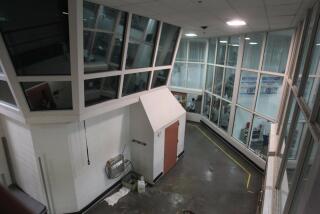Inmate’s family sues San Diego County over his death, alleges it was COVID
SAN DIEGO — On June 29, San Diego County sheriff’s deputies at the Vista Detention Facility found Mark Armendo unresponsive on the floor of his cell.
Jail staff began administering CPR in an attempt to revive the 34-year-old, but their efforts were unsuccessful. They called 911, and paramedics brought Armendo to Tri-City Medical Center for emergency treatment.
His condition worsened. Armendo was suffering from pneumonia and seizures. He was moved to UC San Diego Medical Center on July 4 “for a higher level of care,” but the medical experts could not save him, according to an investigation by the San Diego County medical examiner’s office.
Armendo died Aug. 21 of an undetermined seizure disorder, with a pulmonary thromboembolism — a blocked artery in his lungs — pneumonia and a staph infection listed as contributing factors in the medical examiner’s report.
Armendo’s family sued San Diego County on Nov. 20, alleging Armendo was infected with the coronavirus while at the Vista jail.
“Mark began experiencing serious and obvious medical conditions requiring immediate care, including respiratory distress substantially caused by a disease believed (based on current information) to be COVID-19,” states the lawsuit filed in San Diego County Superior Court.
“He was down in his jail cell for a significant period of time and was pulseless when discovered by jail staff,” the complaint adds.
All four of his listed underlying medical conditions are potential side effects of COVID-19, public health researchers have said.
The lawsuit did not say when Armendo was tested for the coronavirus or who made the diagnosis.
San Diego County Sheriff’s Department officials rejected the idea that Armendo contracted the coronavirus in jail.
“The department’s position is that he did not” get sick in custody, department spokesman Lt. Ricardo Lopez said in an email.
“While you are correct that Mr. Armendo ‘was hospitalized,’” Lopez wrote in response to questions from the San Diego Union-Tribune, “I want to be clear, Mr. Armendo was not hospitalized as a result of COVID-19.”
Lopez did not respond to follow-up questions, including where else Armendo might have become infected.
Three days after Armendo was sent to the emergency room, San Diego County jail commanders announced new coronavirus testing procedures.
“It is now part of our booking process to test every person who arrives in our jails,” the Sheriff’s Department said in a July 2 news release.
Deputies also were told to quarantine incoming detainees for seven days, and the department initiated education and counseling services to promote awareness of the virus.
The changes came as coronavirus cases grew more prevalent across the county’s seven jails.
According to the department, at least 28 employees and 25 inmates had been infected by July 10, the week after Armendo collapsed in his cell. Infections have escalated since then.
On Wednesday, officials said at least 222 inmates had tested positive for the virus, including 83 active cases. At the same time, 149 employees had been sickened, they said, including a counselor at Las Colinas women’s jail who died in late October.
The department reports that no inmates have died of COVID-19.
Inmates have complained for months that they are not receiving enough soap, sanitizer or protective supplies to effectively prevent the coronavirus from spreading throughout the jails.
Sheriff’s Department employees also have told the Union-Tribune that they have not been given enough protective gear and that the rules for preventing outbreaks are not uniformly enforced.
After confirming a recent outbreak in the George Bailey Detention Facility in the San Diego community of Otay Mesa, the Sheriff’s Department said in a news release that it was “working closely with the Department of Public Health concerning our ongoing COVID-19 response” and that it was “committed to the safety, security, health and well-being of people in our custody.”
The medical examiner’s investigation noted that Armendo’s mother, Patrice Clines, said he had no underlying medical conditions before he was arrested in February on suspicion of selling methamphetamine outside a homeless shelter and booked into jail.
Armendo was sentenced to 32 months in state prison two weeks before he was found unconscious.
Court records showed he was officially released from custody July 6, a week after he was hospitalized, at the recommendation of the district attorney’s office. But he never left the hospital.
“In light of Mr. Armendo’s medical condition, including his positive Covid diagnosis along with the Covid-19 pandemic, the people recommend that the defendant’s sentence should be recalled,” the court order says.
As a result, Sheriff’s Department officials did not report Armendo’s case as an in-custody death. If they had, it would have brought the total number of inmate fatalities this year to 10.
The Union-Tribune reported last week that five of those fatalities occurred since the beginning of October, one of the largest increases in San Diego jail deaths in recent years.
A six-month Union-Tribune investigation published last year found that San Diego County had the highest mortality rate among California’s largest jail systems.
Sheriff’s Department officials say they work continuously to prevent in-custody deaths. They say they have boosted healthcare spending, hired additional staffers and rewritten policies to protect inmates.
Similar to other lawsuits filed by families of people who have died in San Diego jails, the Clines’ complaint argues that county officials such as Sheriff Bill Gore fail to provide inmates with proper medical care.
“By June 2020, the county’s final policymakers were on notice of the countless deaths of, and injuries to, inmates from the denial of medical care in county jails,” the complaint states. “These individuals were also on notice of the serious medical risks and needs arising from COVID-19.”
Because Armendo had been released from custody before his death, the medical examiner’s office initially did not assume immediate jurisdiction.
That changed after coroner’s investigators reviewed the case in late August. A note on the autopsy report describes it as a “death in custody case.”
The same document showed that Armendo’s body had been scheduled for cremation but was instead sent to a private pathologist for an independent autopsy. A lawyer representing the Armendo family said the findings had not been completed.
The lawsuit, which seeks unspecified damages for Armendo’s mother and his minor son, has been assigned to Judge Timothy B. Taylor. San Diego County has yet to respond to the allegations. A pretrial conference has been tentatively set for June 2021.
Davis and McDonald write for the San Diego Union-Tribune.
More to Read
Sign up for Essential California
The most important California stories and recommendations in your inbox every morning.
You may occasionally receive promotional content from the Los Angeles Times.












